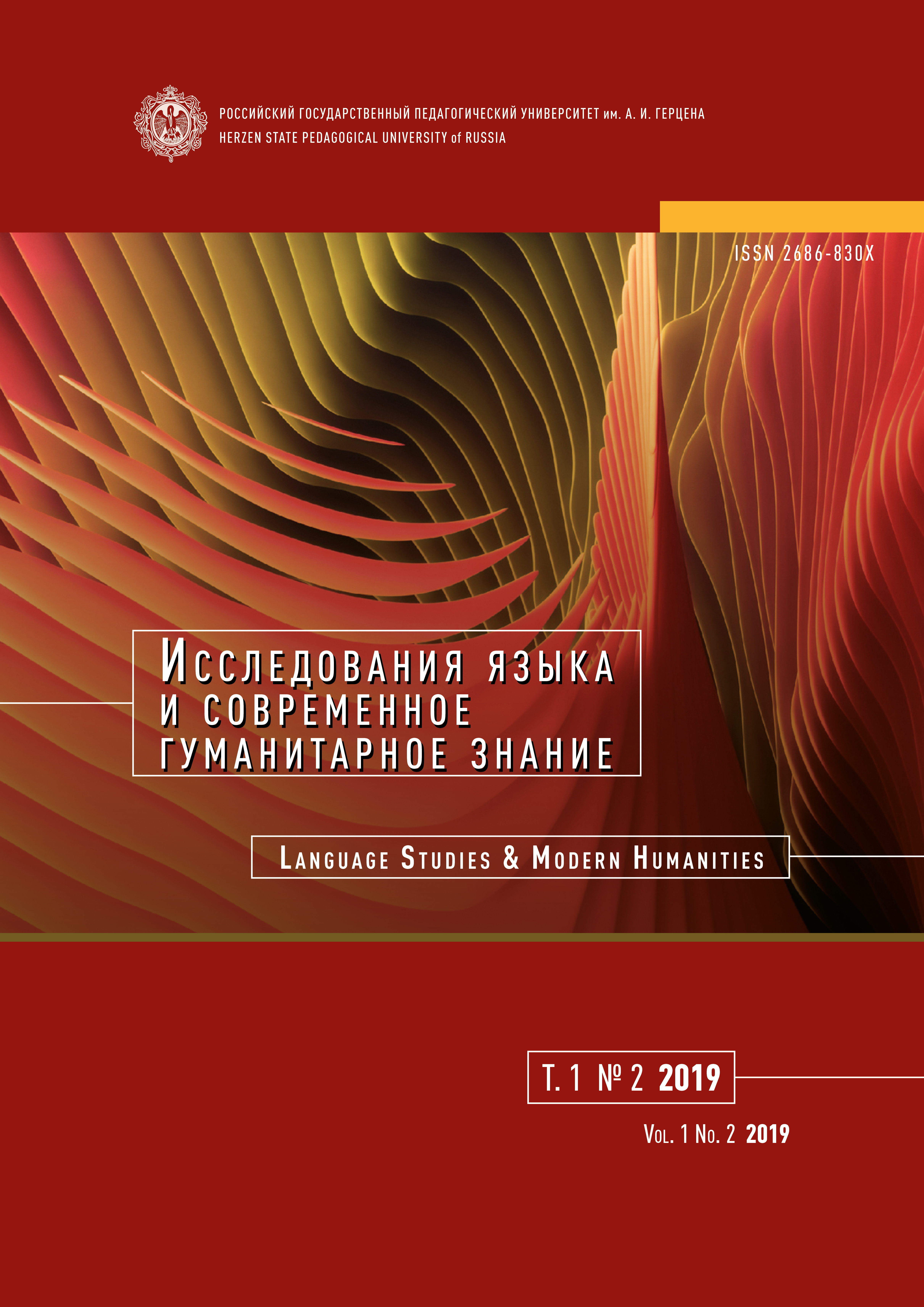Emotive situations presenting transformation of emotions into the polar ones in the English literary text
DOI:
https://doi.org/10.33910/2686-830X-2019-1-2-113-120Keywords:
emotive microtext, emotive situation, polar emotion, opposition, emotive polarity, context, semantic indicator, seme, contextual antonymsAbstract
The article touches upon the language means and ways of representing the transformation of the emotional state and the change of emotions into the opposite ones in the English literary text. The realization of the transition of emotions into polar ones is examined in the text fragments of the modern prose, within the framework of which the emotional episode unfolds. The text fragments under analysis are taken from highly acclaimed works of fiction written in the twentieth and twenty first centuries. This article analyzes various types of situations of emotional transformation, characterized by opposition, polarity of emotions and feelings. Detailed analysis is presented. The article gives an insight into the language means of creating oppositions in one text fragment and shows different lexical and syntactical means of their actualization. Some results of this research are given. It is shown that the emotional state of the participants changes from positive to negative and vice versa in one emotional episode. Different types of the situations characterized by the transformation of emotions are named and described. In the text fragments under consideration, some emotive situations of quick or consistent transformation of emotions, situations of concealing true emotions, analyzing and comparing past and present emotional experiences are presented. Attention is focused on the lexical means representing emotions in the text of fiction. An overview of the lexical units nominating emotions and describing the manifestation of the emotional state and kinematic reactions is given. The article focuses on the language mechanisms responsible for the emergence of contextual oppositions in the text. The emotional transformation is created with the help of some lexical means indicating a quick or gradual change of emotions and syntactical means actualizing the oppositivity in the literary text.
References
ЛИТЕРАТУРА
Баженова, И. С. (2017) Эмоции, прагматика, текст. 2-е изд. Калуга: Изд-во КГУ им. К. Э. Циолковского, 294 с.
Карловская, В. Н. (2009) Репрезентация полярных эмоций в художественном тексте (на материале современной англоязычной прозы). Диссертация на соискание степени кандидата филологических наук. СПб., РГПУ им. А. И. Герцена, 211 с.
Коростова, С. В. (2014) Эмотивно-оценочные смыслы в русском художественном тексте. Ростов-на-Дону: Изд-во Южного федерального университета, 222 с.
Филимонова, О. Е. (2007) Эмоциология текста: анализ репрезентации эмоций в английском тексте. СПб.: Книжный дом, 448 с.
Шаховский, В. И. (2012) Голос эмоций в языковом круге homo sentiens. М.: URSS; Либроком, 141 с.
Штеба, А. А. (2013) К проблеме категоризации «смешанных чувств» (двумодусная экологичность эмоциональной коммуникации). В кн.: Н. Н. Панченко (ред.). Эмотивная лингвоэкология в современном коммуникативном пространстве. Волгоград: Изд-во ВГСПУ «Перемена», с. 401–415.
SOURCES
Brookner, A. (1987) A misalliance. London: Grafton, 192 p.
Brookner, A. (1990) Lewis Percy. Harmondsworth: Penguin Books, 261 p.
Lawrence, D. H. (1977) The Prussian officer. In: D. Trilling (ed.). The portable D. H. Lawrence. New York: Penguin Books, pp. 36–64.
Lewycka, M. (2006) The short history of tractors in Ukrainian. Harmondsworth: Penguin Books, 304 p.
Lively, P. (1988) Moon tiger. Harmondsworth: Penguin Books, 208 p.
Maugham, W. S. (1978) Of human bondage. Harmondsworth: Penguin Books, 607 p.
McEwan, I. (1999) The innocent. New York: Anchor Books, 270 p.
Mitchell, M. (1993) Gone with the wind. New York: Warner Books, 1024 p.
Smith, Z. (2001) White teeth. London: Penguin Books, X, 541 p.
REFERENCES
Bazhenova, I. S. (2017) Emotsii, pragmatika, tekst [Emotions, pragmatics, text]. 2nd ed. Kaluga: Kaluga State University named after K. E. Tsiolkovski Publ., 294 p. (In Russian)
Karlovskaya, V. N. (2009) Reprezentatsiya polyarnykh emotsij v khudozhestvennom tekste (na materiale sovremennoj angloyazychnoj prozy) [The representation of polar emotions in the literary text (on material of modern English-language prose)]. PhD dissertation (Philology). Saint Petersburg, Herzen State Pedagogical University of Russia, 211 p. (In Russian)
Korostova, S. V. (2014) Emotivno-otsenochnye smysly v russkom khudozhestvennom tekste [Emotionally valued meanings in Russian literary text]. Rostov-on-Don: Southern Federal University Publ., 222 p. (In Russian)
Filimonova, O. E. (2007) Emotsiologiya teksta: Analiz reprezentatsii emotsij v anglijskom tekste [Text emotiology: Representation of emotions in the English text]. Saint Petersburg: Knizhnyj dom Publ., 448 p. (In Russian)
Shakhovsky, V. I. (2012) Golos emotsij v yazykovom kruge homo sentiens [The voice of emotions in the homo sentiens language]. Moscow: URSS Publ.; Librocom Publ., 141 p. (In Russian)
Shteba, A. A. (2013) K probleme kategorizatsii “smeshannykh chuvstv” (dvumodusnaya ekologichnost’ emotsional’noj kommunikatsii) [The problem of mixed feelings categorization (emotional communication)]. In: N. N. Panchenko (ed.). Emotivnaya lingvoekologiya v sovremennom kommunikativnom prostranstve [Emotional lingvoecology in the modern communicative space]. Volgograd: Volgograd State Socio-Pedagogical University “Peremena” Publ., pp. 401–415. (In Russian)
Downloads
Published
Issue
Section
License
Copyright (c) 2019 Valeria N. Karlovskaya

This work is licensed under a Creative Commons Attribution-NonCommercial 4.0 International License.
The work is provided under the terms of the Public Offer and of Creative Commons public license Creative Commons Attribution 4.0 International (CC BY 4.0).
This license permits an unlimited number of users to copy and redistribute the material in any medium or format, and to remix, transform, and build upon the material for any purpose, including commercial use.
This license retains copyright for the authors but allows others to freely distribute, use, and adapt the work, on the mandatory condition that appropriate credit is given. Users must provide a correct link to the original publication in our journal, cite the authors' names, and indicate if any changes were made.
Copyright remains with the authors. The CC BY 4.0 license does not transfer rights to third parties but rather grants users prior permission for use, provided the attribution condition is met. Any use of the work will be governed by the terms of this license.







